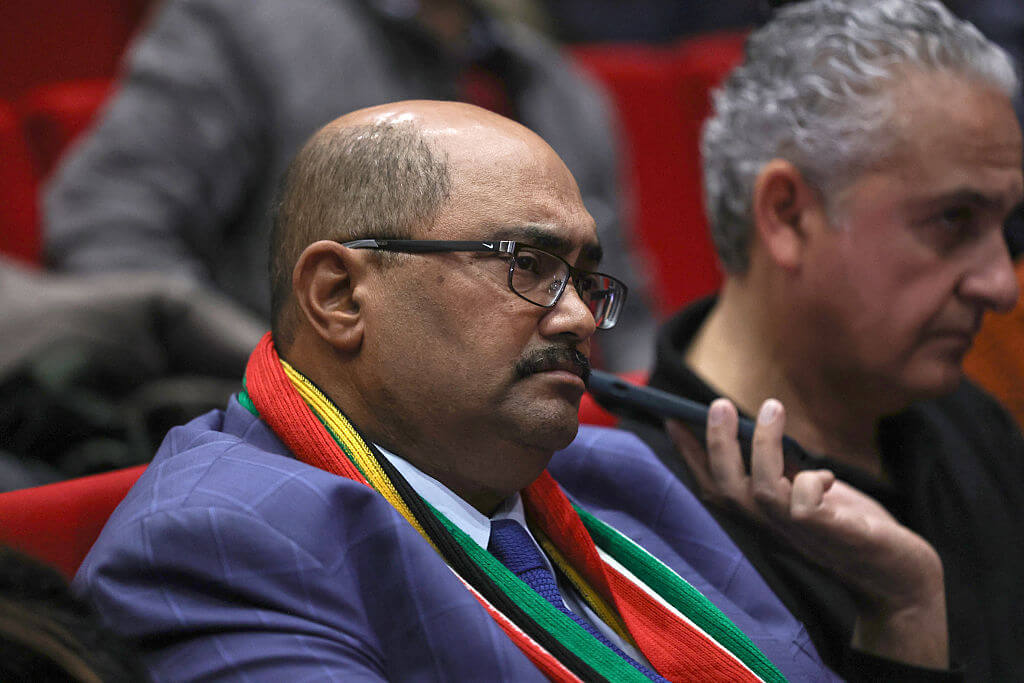Bibi, Responding to Clinton, Says Israel Has Proved Commitment to Peace
Prime Minister Benjamin Netanyahu declared on Tuesday that Israel had proved its commitment to peace before both in words and actions, after U.S. Secretary of State Hillary Clinton urged Jerusalem to do more to prove it was serious about the Middle East process.
“The State of Israel appreciates and respects the warm words said by Secretary of State Hillary Clinton regarding the deep bond between the U.S. and Israel, and on the U.S.’ commitment to Israel’s security,” Netanyahu’s office said in a statement.
“With regard to commitments to peace, the government of Israel has proven over the last year that it is commitment to peace, both in words and actions,” said the statement.”
The statement cited as examples Netanyahu’s inaugural foreign policy speech made at Bar Ilan University, the removal of hundreds of roadblocks across the West Bank, and its decision to freeze temporarily construction in West Bank settlements. The latter, said the statement, was even called by Clinton an “unprecedented” move.
Netanyahu’s office added in its statement that the Palestinians were continuing to thwart the political process by demanding preconditions before the resumption of peace talks. “They are orchestrating a de-legitimization campaign against Israel in international institutions.”
“Prime Minister Benjamin Netanyahu again calls on the Palestinians to enter the tent of peace without preconditions, because that is the only way to reach a settlement that will ensure peace, security and prosperity for both nations,” said the statement.
U.S. awaiting Israel’s response
Israel’s announcement of plans to build 1,600 housing units in East Jerusalem has strained ties with the United States, which has said it regarded last week’s decision – made public while Vice President Joe Biden was in Israel – as an insult.
The announcement has called into question U.S. efforts to launch indirect peace talks between the two sides after a 15-month hiatus in direct negotiations.
Clinton last week made specific demands of Netanyahu about the housing project and about showing commitment to U.S.-mediated indirect peace talks, the State Department has said.
“We do expect to have the Israeli response shortly,” State Department spokesman P.J. Crowley told reporters on Tuesday. “I would anticipate that, you know, very soon there is likely going to be a conversation between the secretary and Prime Minister Netanyahu.”
Crowley said he was “not forecasting that’ll happen today,” but did expect the conversation to occur sometime this week.”
When asked whether the U.S. was putting impossible political pressure on Netanyahu, Crowley said: “We are pursuing peace in the Middle East. We are looking for the best way to get the parties into formal negotiations that lead to a comprehensive peace agreement. That is in our interest. It is in Israel’s interest. It is in the Palestinian interest.
“And we are – we are playing the role that we’ve always played in this peace process. And we’re going to push the parties as hard as we can, as far as we can. Ultimately, they’re the ones that have to sit together and work through these challenging issues. We’re just trying to find the right recipe to get them to the table.”
Clinton dismisses suggestions of crisis in Israel ties
In her remarks on Tuesday, Clinton said that Israel must prove it is committment, but brushed aside suggestions that U.S.-Israeli relations are in crisis.
U.S. and Israeli officials are in intense talks over “steps that we think would demonstrate the requisite commitment to the process,” said Clinton.
She added that the Obama administration was awaiting a response from Israel to suggestions on how to repair damage caused by last week’s announcement of new housing in East Jerusalem.
At the same time, Clinton said she did not think ties between the U.S. and Israel were in danger. She said the United States and Israel have a “close, unshakable bond” and that Washington remained absolutely committed to Israeli security.
“We have an absolute commitment to Israel’s security. We have a close, unshakable bond between the United States and Israel,” Clinton told a news briefing, markedly softening the rhetoric after several days of sharp diplomatic exchanges over Israel’s announcement of new settlement construction.
Clinton also urged Hamas to join in the peace process, though she said the U.S. was concerned that “the voices of moderation are being undermined at the moment within Gaza.”
“The Palestinian Authority made the decision to dealwith Israel, to move forward on a path to peace some years ago, and we would welcome Hamas making the same decision,” she said.
Congresswoman Nita Lowey (D-NY), Chair of the Appropriations State and Foreign Operations Subcommittee, also released a statement on Tuesday declaring: “Israel is and will remain the United States’ most stalwart ally.”
Co-Chairman of the House and Senate Foreign Affairs committees, Congressman Howard Berman, defended the Obama administration’s rebuke and called on Israel to ensure such moves not happen again,
“The Administration had real justification for being upset with the timing of the settlements announcement,” he said in a statement. “A process was supposed to be in place to keep the United States from being blindsided by just such a development, and yet once again we were blindsided. The Israeli leadership needs to get this right and put a system in place so it won’t happen again.
“We need to disentangle bilateral relations from the peace process,” he added. “Let’s keep in mind that peace talks are not a gift to one party or the other. They are an opportunity for both parties, Israelis and Palestinians, both of whom badly need peace.
“The Palestinians may not like an Israeli announcement about prospective housing in Jerusalem, and the Israelis may not like the Palestinians naming a town square after a brutal terrorist, but the talks need to go forward.”
U.S. envoy delays Mideast visit
Meanwhile, a visit to Israel by U.S. special peace envoy George Mitchell was on hold on Tuesday pending an Israeli response to a series of American demands.
Mitchell had been due to leave Washington for Israel early on Monday but will delay his trip in a sign of the Obama administration’s growing anger at Israel’s refusal to stop building Jewish homes in East Jerusalem.
A State Department spokesman said that Mitchell had postponed his visit because it “has become logistically impossible for him to leave for the region, have meetings in Israel and the West Bank, and make it to Moscow in time.”
“He is in continued contact with Israeli and Palestinian leaders and will continue his discussions to move the proximity talks forward,” said the officials, adding that Mitchell would meet with Prime Minister Benjamin Netanyahu and Palestinian President Mahmoud Abbas in the near future.
State Department spokesman P.J. Crowley said Mitchell would meet Israeli and Palestinian officials “as soon as possible,” but not before a gathering of the quartet of Middle East peace mediators in Moscow on Thursday and Friday as he had planned.
Netanyahu has refused to draw a line under a crisis in Israeli-U.S. relations that erupted last week when Israel announced plans for 1,600 new housing units in Ramat Shlomo, an Orthodox Jewish suburb beyond the Green Line in the northeast of the city.
Mitchell was thought to have delayed his travel plans until late Tuesday but may now cancel his visit to Israel altogether, instead flying straight to Moscow for talks with the ‘Quartet’ of Middle East peace mediators – the European Union, the United Nations, the United States and Russia.
“We want to make sure that we have the commitment from both sides that when he travels we can make progress,” Crowley said.
Late Monday, Israel’s foreign ministry was still in last ditch negotiations to dissuade Mitchell from calling off his trip.
“Mitchell is hesitant as he is not convinced that the timing of the visit, at a moment of high tension between Israel and the U.S., is genuinely conducive to advancing negotiations between Israel and the Palestinian Authority,” a senior Israeli official told Haaretz.
According to a report in The Washington Post on Tuesday, U.S. officials say that Mitchell’s visit will remain on hold until the White House receives an Israeli response to key demands.
Israel must reverse its approval for construction in Ramat Shlomo, make a “substantial gesture” towards the Palestinians and publicly declare that all of the “core issues” in the Israeli-Palestinian conflict, including the status of Jerusalem, be included in upcoming talks.
The three conditions, set by U.S. Secretary of State Hillary Clinton in a 43-minute telephone call to Netanyahu on Friday, have not been publicized by the U.S. – but Israel is expected to provide a formal answer on Tuesday, the Post reported.
Israeli officials told Haaretz on Tuesday that despite the growing diplomatic storm, Netanyahu had no plans to cancel a scheduled trip to Washington on Sunday, where he will address a meeting of pro-Israel lobby group AIPAC.
Ahead of the trip, Israeli diplomats were making concerted efforts to arrange a “reconciliation” meeting between the prime minister and U.S. Vice President Joe Biden.
According to the Washington Post, American officials see a resolution to the current crisis as a test of Netanyahu’s commitment to ties with the U.S.
“We have to have guarantees that these kinds of things will not happen again,” a senior U.S. official told the paper, speaking on condition of anonymity.
“If he is unwilling to make that kind of commitment, it raises the question of how committed he is to negotiations – and it raises the question of how committed he is to the relationship between Israel and the United States.”
The United States, which over the past year has pushed unsuccessfully for a total construction freeze across the West Bank, including in east Jerusalem, has until now accepted unofficial assurances that Israel is restricting settlement building.
But following Israel’s latest declaration of plans to build in Ramat Shlomo, the U.S. changed tack, demanding that Netanyahu commit publicly to a building freeze in Jerusalem.
“He has to take a firm stand to prevent similar kinds of announcements that will have a negative effect on negotiations,” the official said














